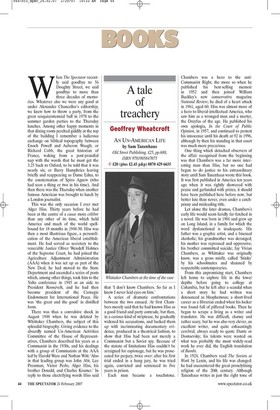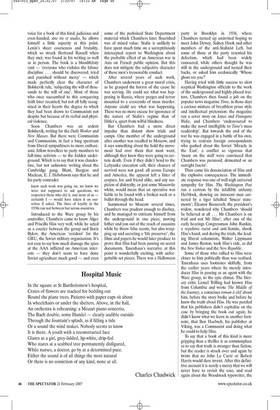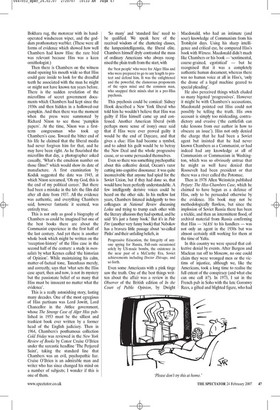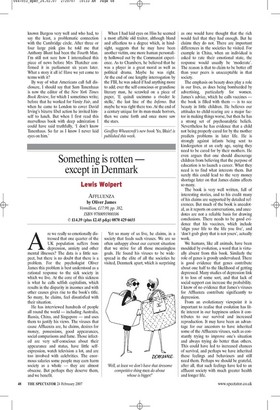A tale of treachery
Geoffrey Wheatcroft AN UN-AMERICAN LIFE by Sam Tanenhaus Old Street Publishing, £25, pp.688, ISBN 9781905847075 © £20 (plus £2.45 p&p) 0870 429 6655 Ivhen The Spectator recently said goodbye to 56 Doughty Street, we said goodbye to more than three decades of memories. Whatever else we were any good at under Alexander Chancellor's editorship, we knew how to throw a party, from the great sesquicentennial ball in 1978 to the summer garden parties to the Thursday lunches. Among other happy moments in that dining room perched giddily at the top of the building I remember a ludicrous exchange on biblical topography between Enoch Powell and Auberon Waugh; or Richard Cobb, the great historian of France, waking from a post-prandial nap with the words that he must get the 3.25 back to Oxford, to be told that it was nearly six; or Barry Humphries leaving briefly and reappearing as Dame Edna, to the consternation of Spiro Agnew (who had seen a thing or two in his time). And then there was the Thursday when another famous American was brought to lunch by a London journalist.
This was the only occasion I ever met Alger Hiss. Thirty years before he had been at the centre of a cause more célèbre than any other of its time, which held America and much of the world spellbound for 18 months in 1948-50. Hiss was then a most illustrious figure, a personification of the American liberal establishment. He had served as secretary to the venerable Justice Oliver Wendell Holmes of the Supreme Court, he had joined the Agriculture Adjustment Administration (AAA) when it was set up as part of the New Deal, he had moved to the State Department and ascended a series of posts which, among other things, took him to the Yalta conference in 1945 as an aide to President Roosevelt, and he had then become president of the Carnegie Endowment for International Peace. He was `the great and the good' in distilled form.
There was thus a convulsive shock in August 1948 when he was delated by Whittaker Chambers, the subject of this splendid biography. Giving evidence to the absurdly named Un-American Activities Committee of the House of Representatives, Chambers described his years as a Communist in the 1930s, and his dealings with a group of Communists at the AAA led by Harold Ware and Nathan Witt: Also in that leading group was John Abt, Lee Pressman, Victor Perlo, Alger Hiss, his brother Donald, and Charles Kramer.' In reply to those electrifying words Hiss said that 'I don't know Chambers. So far as I know I never laid eyes on him' A series of dramatic confrontations between the two ensued. At first Chambers merely said that he had known Hiss as a good friend and party comrade, but then, in a curious kind of striptease, he gradually widened his accusations, and backed them up with incriminating documentary evidence, produced in a theatrical fashion, to show that Hiss had been not merely a Communist but a Soviet spy. Because of the statute of limitations Hiss couldn't be arraigned for espionage, but he was prosecuted for perjury, twice over: after his first trial ended in a hung jury, he was tried again, convicted and sentenced to five years in prison.
Each man became a touchstone.
Chambers was a hero to the antiCommunist Right, the more so when he published his best-selling memoir in 1952 and then joined William Buckley's new conservative magazine National Review; he died of a heart attack in 1961, aged 60. Hiss was almost more of a hero to liberal-intellectual America, who saw him as a wronged man and a martyr, the Dreyfus of the age. He published his own apologia, In the Court of Public Opinion, in 1957, and continued to protest his innocence until his death at 92 in 1996, although by then his standing in that court was much more precarious.
One thing which detached observers of the affair recognised from the beginning was that Chambers was a far more interesting man than Hiss, but no one had begun to do justice to his extraordinary story until Sam Tanenhaus wrote this book. It was first published in America ten years ago when it was rightly showered with praise and garlanded with prizes; it should have been published here before now, but better late than never, even under a catchpenny and misleading title.
Let alone the later dramas, Chambers's early life would seem luridly far-fetched in a novel. He was born in 1901 and grew up on Long Island, in a family for which the word dysfunctional is inadequate. His father was a graphic artist, and a bisexual alcoholic; his grandmother was deranged; his mother was repressed and oppressive; his brother committed suicide; Jay Vivian Chambers, as Whittaker was originally know, was a gross misfit, called 'Stinky' by his schoolmates and shunned by respectable contemporaries.
From this unpromising start, Chambers left home to explore life in the lower depths before going to college at Columbia, but he left after a scandal when a short story he had written was denounced as blasphemous; a short-lived career as a librarian ended when his locker was found full of pilfered books. Then he began to scrape a living as a writer and translator. He was difficult, clumsy and rather scary, but he was also very clever, an excellent writer, and quite exhaustingly cerebral, always ready to quote Dante or Dostoevsky; his talents were wasted on what was probably the most widely-read work he ever did, the English translation of Bambi.
In 1924, Chambers read The Soviets at Work by Lenin, and his life was changed: he had encountered the great proselytising religion of the 20th century. Although Tanenhaus writes in just the right tone of voice for a book of this kind, judicious and even-handed, sine ira et studio, he allows himself a little asperity at this point. Lenin's sheer coarseness and brutality, which so struck Bertrand Russell when they met, was found in his writing as well as in person. The book is a bloodthirsty rant — 'everyone who violates the labour discipline . . . should be discovered, tried and punished without mercy' — which made perfectly clear the character of Bolshevik rule, 'subjecting the will of thousands to the will of one'. Most of those who once succumbed to this conquering faith later recanted, but not all fully recognised in their hearts the degree to which they had been drawn to Communism not despite but because of its verbal and physical violence.
Soon Chambers was an ardent Bolshevik, writing for the Daily Worker and New Masses. But there were Communists and Communists, in fact a long spectrum from liberal sympathisers to more enthusiastic fellow-travellers to party members to full-time activists — to the hidden underground. Which is to say that it was clandestine, but not unknown: writing about the Cambridge gang, Blunt, Burgess and Maclean, E. J. Hobsbawm says that he and his party comrades knew such work was going on, we knew we were not supposed to ask questions, we respected those who did it, and most of us — certainly I — would have taken it on ourselves if asked. The lines of loyalty in the 1930s ran not between but across countries.
Introduced to the Ware group by his controller, Chambers came to know Alger and Priscilla Hiss very well, while he acted as a courier between the group and Boris Bykov, the American `rezidenf for the GRU, the Soviet military organisation. It's not easy to say how much damage the spies at the AAA inflicted on American interests — they don't seem to have done Soviet agriculture much good — and even some of the purloined State Department material which Chambers later flourished was of mixed value: Stalin is unlikely to have spent much time on a surreptitiously intercepted report to Washington about the probable effect of an American war in Asia on French public opinion. But this does not mitigate the subjective character of these men's treasonable conduct.
After several years of such work, Chambers underwent a great moral crisis, as he grasped the horror of the cause he was serving. He could see what was happening in Russia, where purges and terror mounted to a crescendo of mass murder. Anyone could see what was happening. There was no more excuse for ignorance of the nature of Stalin's regime than of Hitler's, apart from wilful blindness.
But Chambers had a more direct impulse than distant show trials and camps. One member of the underground after another was recalled to Moscow, and it says something about the hold the movement had over them that most went, although they knew they were going to certain death. Even if they didn't bend to the Lubyanka execution cell, their chances of survival were not good: all across Europe and America, the apparat left a litter of corpses, foe and friend alike, and any suspicion of disloyalty, or just some Muscovite whim, would mean that an operative was liable to be found with a broken neck or a bullet through the head.
Summoned to Moscow several times, Chambers was prudent enough to disobey, and he managed to extricate himself from the underground in one piece, moving hither and yon out of the reach of assassins while he threw false scents, but also wrapping up and secreting a 'life preserver', the films and papers he would later produce to prove that Hiss had been passing on secret documents. Tanenhaus's narrative at this point is wonderfully exciting, with unforgettable set pieces. There was a Halloween party in Brooklyn in 1938, where Chambers turned up uninvited hoping to meet John Dewey, Sidney Hook and other members of the anti-Stalinist Left, but some of those at the party resented his defection, which had been widely rumoured, while others thought he was still in the underground and turned their backs, or asked him sardonically 'Whose ghost are you?'
Having tried with little success to alert sceptical Washington officials to the work of the underground and highly-placed traitors, Chambers then found a job on the popular news magazine Time, in those days a curious mixture of breathless prose style and intellectual pretension: the magazine ran a cover story on Joyce and Finnegans Wake, and Chambers 'endeavoured to make the novel intelligible to Time's mass readership'. But towards the end of the war he was engaged in a battle of his own, trying to restrain foreign corespondents who gushed about the Soviet 'Miracle in the East', a conflict so vigorous that 'many on the staff were convinced that Chambers was paranoid, demented or an outright fascist'.
Then came his denunciation of Hiss and the explosive consequences. The immediate response was one of well-nigh universal sympathy for Hiss. The Washington Post ran a cartoon by the infallibly unfunny Herblock, showing an innocent man cornered by a tiger labelled 'Smear statements'; Eleanor Roosevelt, the president's widow, wondered why Chambers 'should be believed at all . . . Mr Chambers is on trial and not Mr Hiss'; after one of the early hearings Congressman John Rankin, a repulsive racist and anti-Semite, shook Hiss's hand; and during the trials, the leading liberal columnists, Walter Lippmann and James Reston, took Hiss's side, as did the New Yorker and the New Republic.
Some of those who rallied to Hiss were closer to him politically than was realised. Tanenhaus uses footnotes skilfully, from the earlier years where he merely introduces Hiss in passing as an agent with the Ware group, to the epic climax. The literary critic Lionel Trilling had known Hiss from Columbia and wrote The Middle of the Journey, a conscious roman a clef about him, before the story broke and before he knew the truth about Hiss. He was puzzled that his publishers didn't capitalise on the case by bringing the book out again; he didn't know what we learn in another footnote, that Ben Huebsch, his publisher at Viking, was a Communist and doing what he could to help Hiss.
To say that a book of this kind is more gripping than a thriller is as commonplace as to say that truth is stranger than fiction, but the reader is struck over and again by twists that no John Le Carre or Robert Harris would dare invent. After this definitive account it is surely a mercy that we will never have to revisit the case, and read again about the Woodstock typewriter, the Bokhara rug, the motorcar with its handoperated windscreen wiper, and the goddam prothonotary warbler. (These were all forms of evidence which showed how well Chambers had know Hiss: the rare bird was relevant because Hiss was a keen ornithologist.) Then there is Chambers on the witness stand opening his mouth wide so that Hiss could gaze inside to look for the dreadful teeth he associated with the man he might or might not have known ten years before. There is the sudden revelation of the microfilms of secret government documents which Chambers had kept since the 1930s and then hidden in a hollowed-out pumpkin. And then there was the moment when the press were summoned by Richard Nixon to see those 'pumpkin papers'. At the time, Nixon was a firstterm congressman who took up Chambers's case. Toward the bitter end of his life he claimed that the liberal media had never forgiven him for that, and he may have been right. As he flourished the microfilm that day, a photographer asked casually, 'What's the emulsion number on those films?' which would show its date of manufacture. A first examination by Kodak suggested the date was 1945, at which Nixon screamed, 'Oh my God, this is the end of my political career.' But there had been a mistake in the lab: the film did after all date from 1937. All the evidence was authentic, and everything Chambers said, however fantastic it seemed, was entirely true.
This is not only as good a biography of Chambers as could be imagined but one of the best books there are about the Communist experience in the first half of the last century. And yet there is another whole book which might be written on the 'reception-history' of the Hiss case in the second half of the century: a study in mentalites by what Keynes called `the historian of Opinion'. While maintaining his calm, matter-of-factual tone, Tanenhaus merely, and correctly, says that 'what sets the Hiss case apart, then and now, is not its mystery but the passionate belief of so many that Hiss must be innocent no matter what the evidence'.
This is a really astonishing story, lasting many decades. One of the most egregious of Hiss partisans was Lord Jowitt, Lord Chancellor in the Attlee government, whose The Strange Case of Alger Hiss published in 1953 must be the silliest and trashiest book ever written by a former head of the English judiciary. Then in 1964, Chambers's posthumous collection Cold Friday was reviewed in the New York Review of Books by Conor Cruise O'Brien under the sarcastic headline 'The Perjured Saint', taking the standard line that Chambers was an evil, psychopathic liar. Cruise O'Brien is an admirable man and writer who has since changed his mind on a number of subjects; I wonder if this is one of them.
`So many' and 'standard line' need to be qualified. We speak here of the received wisdom of the chattering classes, the lumpenintelligenstia, the liberal elite. Chambers himself dryly contrasted the mass of ordinary Americans who always recognised the plain truth from the start, with the 'best people' who were for Alger Hiss and who were prepared to go to any length to protect and defend him. It was the enlightened and the powerful, the clamorous proponents of the open mind and the common man, who snapped their minds shut in a pro-Hiss psychosis.
This psychosis could be comical: Sidney Hook described a New York liberal who told him he wouldn't believe that Hiss was guilty if Hiss himself came up and confessed. Another American liberal (with perhaps more sense of irony) once said that if Hiss were ever proved guilty it would be the end of Daycare, and that gives a clue: Hiss had become a symbol, and to admit his guilt would be to betray the New Deal and the whole progressive cause, or so some persuaded themselves.
Even so there was something psychopathic about this collective denial, Occam's razor cutting into cognitive dissonance: it was quite inconceivable that anyone had spied for the Soviet Union, but if they had done so, that would have been perfectly understandable. A few intelligently derisive voices could be heard on the other side. In his mellow last years, Chambers listened indulgently to two colleagues at National Review discussing Lolita and trying to trump each other with the literary allusions they had spotted, and he said 'It's just a funny book.' But it's in Pale Fire (another very funny book) that Nabokov has a bravura little passage about 'so-called Pinks' and their unfailing beliefs, in Progressive Education, the Integrity of anyone spying for Russia, Fall-outs occasioned solely by US-made bombs, the existence in the near past of a McCarthy Era, Soviet achievements including Doctor Zhivago, and so forth.
Even some Americans with a pink tinge saw the truth. One of the best things written about the affair was a review in the Observer of the British edition of In the Court of Public Opinion, by Dwight Macdonald, who had an intimate (and sour) knowledge of Communism from his Trotskyist days. Using his sharp intelligence and critical eye, he compared Hiss's book with Witness. Macdonald didn't much like Chambers or his book — 'sentimental, coarse-grained, egotistical' — but he recognised that it was a completely authentic human document, whereas there was no human voice at all in Hiss's, 'only the drone of a legal machine geared to special pleading'.
He also perceived things which eluded so many bigoted 'progressives'. However it might be with Chambers's accusations, Macdonald pointed out Hiss could not possibly be telling the truth. His own account is simply too misleading, contradictory and evasive (the cuttlefish can take lessons from our author in how to obscure an issue'). Hiss not only denied the charge that he had been a Soviet agent but insisted that he had never known Chambers as a Communist, or had indeed had any knowledge at all of Communists or Communism in Washington, which was so obviously untrue that he might as well have denied that Roosevelt had been president or that there was a river called the Potomac.
Then in 1978 Allen Weinstein published Perjury: The Hiss-Chambers Case, which he claimed to have begun as a defence of Hiss, only to be persuaded otherwise by the evidence. His book may not be methodologically flawless, but since the implosion of Soviet Russia there has been a trickle, and then an intermittent flood, of archival material from Russia confirming that Hiss — ALES' to his handlers — was not only an agent in the 1930s but was almost certainly still working for them at the time of Yalta.
In this country we were spared that collective denial by events. After Burgess and Maclean ran off to Moscow, no one could claim they were wronged men or the victims of injustice, although we, like the Americans, took a long time to realise the full extent of the conspiracy (and what else can one call it?). In 1973, I sat in the French pub in Soho with the late Goronwy Rees, a gifted and blighted figure, who had known Burgess very well and who had, to say the least, a problematic connection with the Cambridge circle. After three or four large pink gins he told me that Anthony Blunt had been the Fourth Man. I'm still not sure how I internalised this piece of news before Mrs Thatcher confirmed it in parliament six years later. What a story it all is! Have we yet come to terms with it?
By way of what Americans call full disclosure, I should say that Sam Tanenhaus is now the editor of the New York Times Book Review, for which I sometimes write; before that he worked for Vanity Fair, and when he came to London to cover David Irving's bizarre libel action he invited himself to lunch. But when I first read this marvellous book with deep admiration I could have said truthfully, 'I don't know Tanenhaus. So far as I know I never laid eyes on him' When I had laid eyes on Hiss he seemed a most affable old traitor, although bland and affectless to a degree which, in hindsight, suggests that he may have been another victim, one more human personality hollowed out by the Communist experience. As to Chambers, he believed that he was a player in a great moral as well as political drama. Maybe he was right. At the end of one lengthy interrogation by the FBI, he was asked if had anything more to add; ever the self-conscious or grandiose literary man, he scrawled on a piece of paper, 'E quindi uscimmo a riveder le stelle,' the last line of the Inferno. But maybe he was right there too. At the end of a century unique for its man-made horrors, then we came forth and once more saw the stars.
Geoffrey Wheatcroft's new book Yo, Blair! is published this week.

























































 Previous page
Previous page